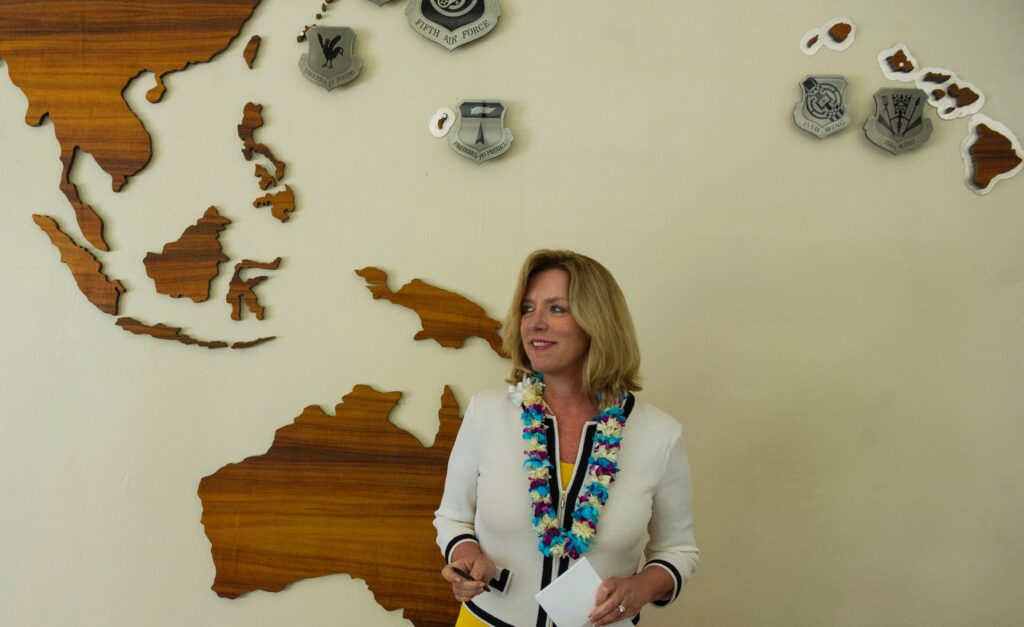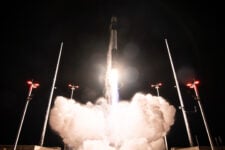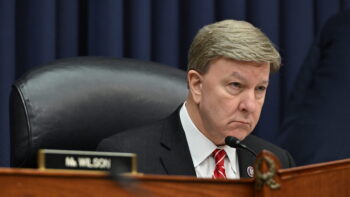
Deborah Lee James
WASHINGTON: The US should push hard to overhaul the entire international legal framework for outer space — including replacing the foundational 1967 Outer Space Treaty (OST), a new report from the Atlantic Council says.
As it moves to do so, the US also should more aggressively court allies with an eye to establishing a “collective security alliance for space” among likeminded countries to “deter aggression” and defend “key resources and access.”
“The 1967 Treaty is dated. It was written, literally, in a different era,” said former Air Force Secretary Deborah Lee James in an Atlantic Council briefing today. “At present it is too broad, and in some cases it’s probably overly specific.”
The year-long study, “The Future of Security In Space: A Thirty-Years US Strategy” was co-chaired by James and retired Marine Corps Gen. Hoss Cartwright, former vice chair of the Joint Chiefs of Staff. In essence, it argues that the US needs to lead international efforts to craft a new rules-based regime to govern all space activities — from exploration to commercial ventures to military interactions. As the two argued in a recent op-ed in Breaking D, “Great-power competition among the United States, China, and Russia has launched into outer space without rules governing the game.”
“The international law of space, centered on the 1967 Outer Space Treaty, is outdated and insufficient for a future of space in which economic activity is primary. The international community needs a new foundational space treaty, and the United States should precipitate its negotiation,” the study argues.
James elaborated that the idea would be to craft a more expansive treaty that covers emerging issues like debris mitigation and removal and commercial extraction of resources from the Moon and/or asteroids. That said, she stressed that the US should not abandon the OST — which has been signed by 193 nations — unless and until something new is there to replace it.
In the medium term, the study says that the US should push for expanding the International Civil Aviation Organization (ICAO) to space, “or creating an ICAO-like organization for space activity.” Interestingly, this very idea was put forward more than a decade ago by a group of scientists and academics, spearheaded by the International Association for the Advancement of Space Safety (IAASS), but was rejected by the US — which traditionally has not wanted to create new international legal structures.
The Atlantic Council report further recommends that the White House create a “special envoy for space” housed in the State Department to handle such negotiations. It also urges the Biden administration move to make the National Space Council permanent, and empower it to craft and drive implementation of a similar 30-year government space strategy.
The study argues that one of the reasons an entire new international, and domestic, regime is necessary is the commercial boom in space and the expectation that commerce over the next 30 years will push all the way out to the Moon and beyond. This is another reason that the US needs to update its own domestic laws — to ensure that they will help “accelerate private-sector use of Earth orbit in the short term, while developing cislunar space toward the end of the thirty-year period.”

Hoss Cartwright
“We’re going to initiate sustained cislunar operations by the late 20s,” said Cartwright. “That’s a big step. That’s utilizing cislunar at a level of scale that it is not there today. The second one is that we’re going to bring in private and competitive commerce into that environment. If the government doesn’t support this, and if we are not able to bring the commercial sector along with us, then we’re going to have what the paper calls the Wild West or Gold Rush scenarios where there are no rules, and everybody’s just doing their own thing.”
Scott Pace, former executive secretary of the National Space Council, cautioned against pushing the Wild West analogy too far — noting that there are norms and rules of behavior. While many of those are voluntary — such as the Committee on the Peaceful Uses of Outer Space (COPUOS) debris mitigation guidelines — they have been negotiated from the “bottom up” and have widespread support, including by potential US adversaries.
Pace also pushed back against calls for adding cislunar protection to the Space Force’s current mission set.
“There are people who look at space and envision a Bluewater Navy — in the Royal Navy or US Navy post-World War II kind of mold. All of our strategic interests are still on Earth, and therefore I think, thinking [about] what SpaceForce is doing as more of a coastal, or even a brown-water Navy is probably a better analogy.”
While stressing that there are threats from Russia, China and others that ought to be driving the US to pursue a new rules-based regime for space, Cartwright and former NASA administrator Charlie Bolden both cautioned that the US needs to avoid hubris — that is, be willing to actually negotiate rather than simply insist others follow its lead.
“The question is can we build relationships and alliances that can sustain themselves through the obvious disagreements that will come,” Cartwright said. It also means that any new “norms and regimes” will need to “be responsive to industry to governments … In other words, the US can’t just say: ‘it’s going to be this way.’ We’ve got to be willing, as Charlie Bolden said, to meet people halfway, and to figure out how to do this.”
Further, Cartwright similarly cautioned against a tendency for US officials to over-hype threats.
“We have to be careful. I mean, if everybody we talk to is the enemy, and there’s a boogeyman behind every question and every opportunity, we’re not going to go anywhere,” he said. “We’re frozen. So we need to find a way to legitimately protect those things that we want to protect, but to be more open and transparent to long term goals, the ability to share space operate together in space compete in space. We probably right now are taking our terrestrial examples and exporting them to space, and that is probably not a good thing to do.”
HASC chair backs Air Force plan on space Guard units (Exclusive)
House Armed Services Chairman Mike Rogers tells Breaking Defense that Guard advocates should not “waste their time” lobbying against the move.



























